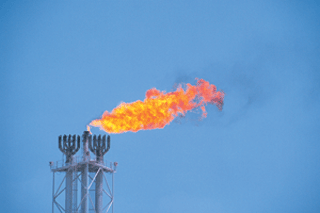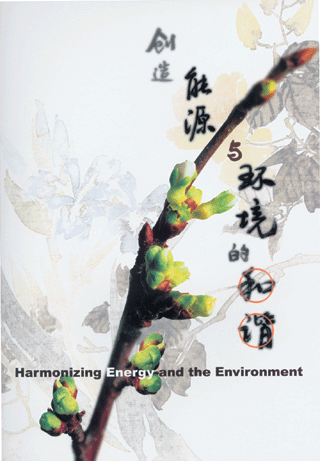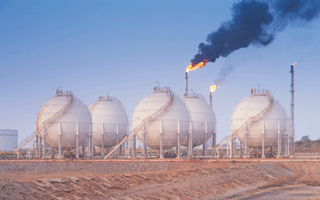
The oil industry got off to a good start in China following the establishment of the Peoples Republic of China in 1949. In the past 50 years, particularly in the recent 20 years of reform and opening up, the oil industry is growing at an unprecedented rate , which vigorously stimulates the sustainable, healthy and fast development of the national economy.
China is a big oil and natural gas producer with rich oil and natural gas resources. According to authoritative statistics, China has 94 billion tons of oil reserves, 38 trillion cubic meters of natural gas reserves, and over 30 trillion cubic meters of coal-bed gas reserves. By the end of 1999, China had 20.3 billion tons of accumulated explored oil in place and 2.2 trillion cubic meters of natural gas in place. In 1978, China's crude production topped 100 million tons. It is expected that China's crude production rate will surpass 160 million tons this year, making the country the fifth largest oil producer in the world for 13 successive years. In the past ten years, China maintained a 13 percent annual growth rate in natural gas reserves, and a nearly five percent annual growth rate in natural gas output. It is estimated that China will produce over 23 billion cubic meters of natural gas this year. The Daqing Oilfield, in particular, has managed to keep an annual crude production rate of 50 million tons over the past 24 years. In the meantime, breakthrough has been made in prospecting and exploiting oil and natural gas in the central and western regions of the country. And the annual output of offshore oil and natural gas production has reached an annual output of 20 million tons. To date, China has built over 20,000 kilometers of long-distance oil and natural gas transmission pipelines. China has basically established an integral engineering technological service system featuring oil prospecting, exploitation, transmission and storage.
At present, China has built a large-scale petrochemical industry, which serves as a prominent pillar industry of the national economy. It has cultivated an annual one-step crude oil refining capacity of 260 million tons, and processed on average 170 million tons of crude oil and produced over 100 million tons of product oils each year. It has built and putsintosoperation 18 sets of dimethylene and corresponding corollary equipment, with an annual dimethylene production capacity of more than 4.2 million tons and actual annual output of nearly four million tons. It has formulated 8.8 million tons of annual production capacity for synthetic resin, and an actual annual output of over seven million tons. And it has 5.5 million tons of annual production capacity for synthetic fiber, and an actual annual output of about five million tons. To date, China has ranked itself among the world's most developed countries in terms of business scale, output and technological equipment in the petrochemical industry.
China keeps opening its oil industry wider to the outside world, and so far has made remarkable results in setting up joint ventures, making cooperation and foreign trade in the sector. Since the beginning of the 1980s, China has implemented the strategy of inviting foreign enterprises to participate in public bidding for oil exploration and development projects, under the rules of three rounds of public bidding for land projects and four rounds for offshore projects. So far, over 100 oil companies from dozens of countries have submitted tenders and signed up more than 180 contracts and agreements, which attract direct foreign investment of US.6 billion in total. Through cooperative exploration, these foreign oil companies and their Chinese counterparts have yielded a total output of more than 14 million tons of oil and cultivated a production capacity of four billion cubic meters of natural gas. China's petrochemical enterprises have also cooperated with a great number of counterparts from foreign countries to set up joint ventures or cooperative projects, continuously expanding the scale of introducing foreign investment. So far, China has established a great deal of large-scale petrochemical joint investment projects, including Dalian West Pacific Oil Refinery, the Yangtze styrene project, the Jinshan polythene project, and the Sichuan vinylon acrtic acid project. China's oil imports and exports have been increasing rapidly as well. In 1999, imports and exports of oil and petrochemical products went beyond 100 tons, totaling over US billion in business value. Meanwhile, China's oil and petrochemical enterprises have walkedsintosthe world market to participate in venture exploration, joint investment and cooperation, and project technological services of oil industry in a dozen of countries, including Canada, Venezuela, Peru, Sudan, Kazakstan and Thailand. It indicates that China's oil industry has emancipated itself from thorough blockade to diversified opening up.
China has been intensifying its efforts to reform the oil industrial management system, and oil and petrochemical enterprises have in turn accelerated their pace of adopting market principles. Under the guide of the overall objective of building up the socialist market economic system, China has launched two rounds of major reforms in the oil industry in the past twenty years. The first round of reforms started in the 1980s, when the country canceled the Ministry of Oil Industry and established in succession three oil companies, namely, CNPC, SINOPEC and CNOOC, indicating the beginning of enterprise-oriented reform in the sector. The second round reform took place a few years ago, when the country reshuffled the governmental organs that administrate the oil industry, and reorganized the two major oil companies of CNPC and SINOPEC, accelerating the pace of building up the modern enterprise system. As a result of these reform measures, China's oil industry has realized tremendous changes in the governmental administrative system and the enterprise operation mechanism. First, it has basically separated government functions from enterprise management. The governmental administrative functions originally undertaken by oil companies and petrochemical companies are now transferred to the State Administration of Oil and Chemical Industry. Second, it has broken off the industrial monopoly originally held by upstream and downstream enterprises, and formed instead a new industrial pattern, in which upstream and downstream enterprises were given priority to certain aspects of the business, keep some overlapping businesses, maintain respective advantages, and compete with each other in good order. Third, China has introduced integrated business operation mechanismssintosthe oil and petrochemical companies, allowing them to set foot both in upstream and downstream enterprises, production and sales, and domestic trade and foreign trade. The government endows the oil and petrochemical companies with sufficient independent management powers, enabling them to operate their businesses in more commercialized manners.

At present, China's oil and petrochemical enterprises, such as CNPC, SINOPEC and CNOOC, have nearly one trillion yuan of gross assets, or 12 percent of the total national assets. It is expected that the gross products of the oil industry will reach 700 billion yuan this year, amounting to more than 10 percent of the gross products of state-owned enterprises and state-controlled enterprises in the country, and realizing total profits of more than 25 billion yuan. According to sales revenue and comprehensive strength, CNPC and SINOPEC have ranked among the top oil companies in the world.
In the beginning of the 21st century, China's oil industry will maintain a fast economic growth rate, and further quicken its pace of reform and opening up.
As proven by the universal laws of oil production in the world, when a country or region's accumulative proven producible oil reserves reach 60 percent of the ultimate producible resources and when it has exploited 70 percent of the total oil reserves, the country will come to the peak of crude production. Now China's proven oil producible reserves account for only 20 percent of the total resources and the proven natural gas producible reserves account for only five percent of the total resources. Of the proven producible reserves, the surplus oil reserves amount to 2.4 billion tons and the surplus natural gas reserves amount to 1.1 trillion tons, indicating that China has great many potential resources for exploitation in the future. It is estimated that in the beginning of the 21st century, China will still have booming oil productions and rapidly increasing natural gas productions. In terms of market demand, China's annual GDP growth rate will keep at about seven percent in the next ten years, according to the overall planning of the national economic development. Demands for oil products will grow at about four percent annually, and demands for petrochemical products of ethylene, synthetic resin and synthetic fiber will grow at higher rates than the overall national economic growth rate in the same period of time. It indicates that the oil and natural gas consumption markets are of great potential in the days to come. Resources and markets are widely recognized as most important foundations for the growth of China's oil industry.
In the beginning of the 21st century, the Chinese government will continue to give top priority to the development of the oil industry, endowing it with sufficient encouragement and support. And the oil industry will follow the fundamental development strategies as follows:
-Adhering to the sustainable development strategy. China will base its oil industry on the domestic market, keep steady growth of oil output, ensure safe and stabilized supply of oil and petrochemical products, improve the energy structure, vigorously develop natural gas and other clean energy sources, give equal emphasis to developing and saving energy resources, and improve efficiency of developing and utilizing energies. It will stress environmental protection to realize harmonious development of oil and petrochemical production and environmental protection.
-Adhering to the market-oriented development strategy. The Chinese government will consistently improve its modes and methods of oil industrial management, exert the fundamental role of the market in resources allocation, establish and improve the market mechanism, and accelerate oil and petrochemical enterprises to transform their economic growth patterns from extensive operations to intensive operations and from stressing external elements to stressing internal elements. It will transform through all means the management mechanism in a bid to establish the modern enterprise system, and upgrade enterprises'verall qualities and market competitive capacities.
-Adhering to the internationalization-oriented development strategy. China will open wider to the outside world, fully apply the domestic and international resources and markets, comprehensively accelerate investment, trade and technological cooperation in the oil and petrochemical sectors, and better unite the development of oil industry in China and the world.
As China makes continuous progress in establishing the socialist market economic system, the systematic reform of the oil industry has entered the most crucial stage. In the beginning of the 21st century, oil enterprises will establish management systems and operational mechanisms that cope with the demands of a market economy. And the government will continue to improve its administration and supervision of the oil industry, and strive to cultivate and develop a unified, open, competitive and orderly market system.
China's oil and petrochemical enterprises will continue to abide by the principles of clearly established ownership, well defined power and responsibility, separation of enterprise and administration, and scientific management, learn from the management modes and organization patterns of international oil companies, accelerate company-oriented reforms, and establish the modern enterprise system.
First, it will accelerate the separation of enterprise and administration. Exclusively-State--owned oil companies or state-invested stock-holding oil companies will follow the operation patterns, in which the state designates representatives to exert the proprietor's performances, and enjoys the rights of making economic benefits, participating to make major decisions, and selecting business managers, in accordance with the proportion of investment, so as to undertake limited liability of enterprises?debts and not to intervene in their daily business operation.
Second, it will speed up strategic reorganization of oil and petrochemical enterprises. This objective will be achieved through reorganizing assets to accumulate quality assets with strong profit earning capacities and to strip off non-performing assets; raising the proportion of direct investment by oil and petrochemical enterprises, and reducing the enterprise debt rates; and accelerating diversified ownership of enterprise stocks, under the condition that the state controls the proprietary. Through business reorganization, it will intensify and simplify the principal business, separate subsidiary business, and consulting international practices, establish new-typed oil companies. It will introduce professional restructuring of the supplementary production and engineering technological service businesses, gradually split off the socialized services from the functions of enterprises to alleviate the social burdens originally undertaken by state-owned enterprises.
Third, it will establish standardized administration structure with due power endowed to the legal entity of the company, in accordance with the Company Law. It will separate ownership from managerial authority, build up independent decision-making authority, executive authority and supervisory authority, define responsibilities among general meeting of stockholders, board of directors, board of supervisors, and managerial staff, to ultimately form a company legal entity administration system featuring division of work marked with clear individual responsibilities, coordinated performances, and effective equilibrium. In the meantime, it will trim the administrative structure and streamline working staff, implement the strategy of reducing staff and redirecting surplus employees step by step, to improve work efficiency and labor productivity. The government will take measures to accelerate the establishment and improvment the social security system, widen up employment channels, and find jobs for laid-off workers, to ensure smooth operation of enterprise restructuring and social stability.

To date, CNPC, SINOPEC and CNOOC have either basically completed or been busy implementing their enterprise restructuring schemes. This process is widely regarded as a continuous step of the great reshuffle of the oil industry in 1998, as well as a major step towards the market-oriented reform of China's oil industry. It is expected that with the arrival of the 21st century, CNPC, SINOPEC and CNOOC will succeed in establishing the modern enterprise system conforming to the international standards and presenting themselves with completely new looks in the society.
|
![]() 本网站由北京信息港提供网络支持
本网站由北京信息港提供网络支持


